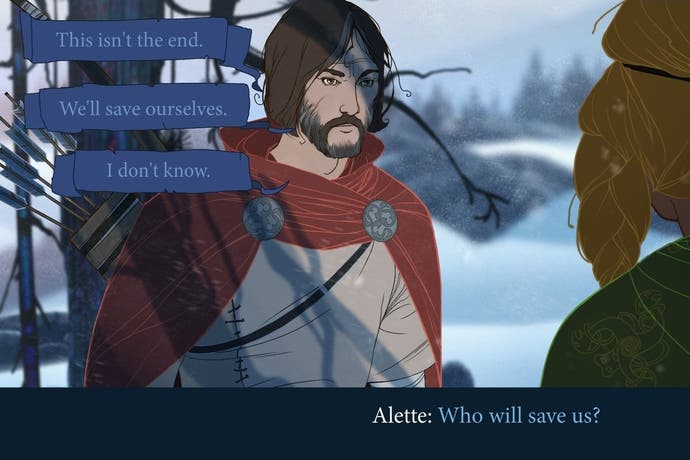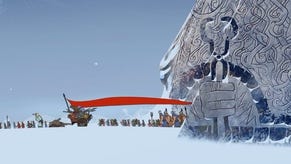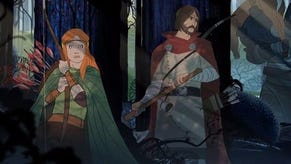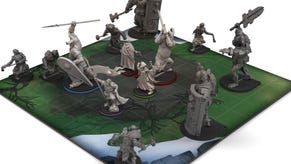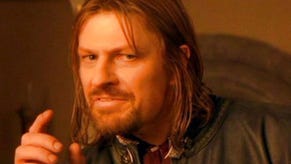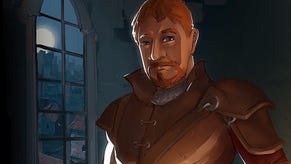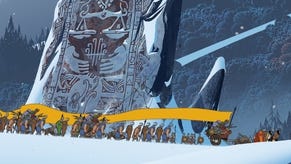King vs The Banner Saga
Inside the David vs Goliath trademark battle that fuelled an indie hit.
On 22nd January 2014, The Banner Saga developer Stoic Studios released a statement about its trademark dispute with mobile game specialist King.com over the word "Saga".
It was as follows:
"Two years ago, the three of us at Stoic set out to make an epic Viking game: The Banner Saga. We did, and people loved it, so we're making another one. We won't make a Viking saga without the word 'Saga,' and we don't appreciate anyone telling us we can't.
"King.com claims they're not attempting to prevent us from using The Banner Saga, and yet their legal opposition to our trademark filing remains. We're humbled by the outpouring of support and honoured to have others stand with us for the right to their own Saga. We just want to make great games."
It was the only statement Stoic released on the matter throughout the entire episode. It didn't need to do anything else, because the internet did the rest of the work for them.
Now, nearly half a year after Stoic and King settled their differences, co-founders John Watson and Arnie Jorgensen are in Eurogamer's meeting room in Brighton and laughing. I suggest the whole trademark dispute must have been pretty worrying and pretty stressful. It was, they say, for a bit, particularly before everyone knew about it. But now, well, now, they're happy it happened.
Here's why.
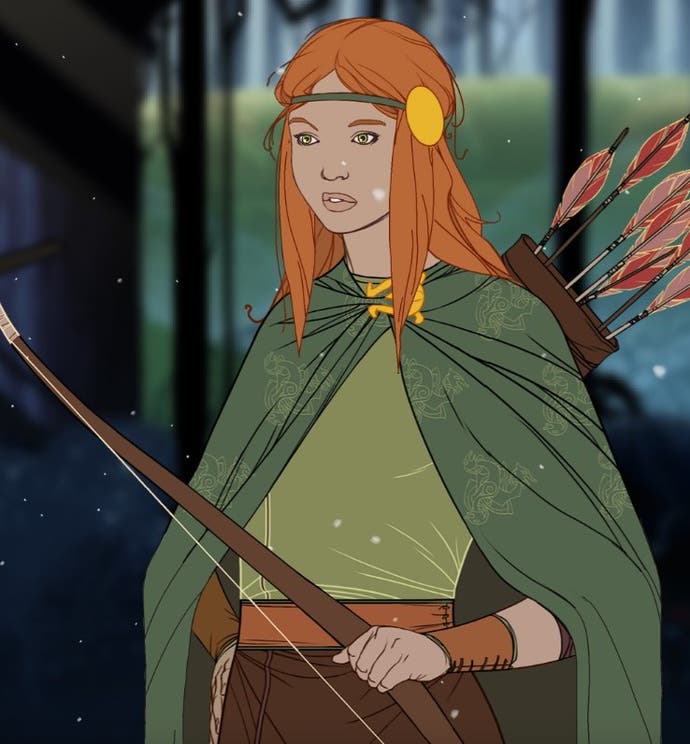
Stoic actually knew about King's attempt to prevent it from using the word saga for months before it hit the headlines. King had filed an objection in the summer of 2013, right in the middle of crunch for the three-person, Austin, Texas-based developer, on the grounds of The Banner Saga being "confusingly and deceptively similar" to King's trademark for the word "Saga".
So, Stoic hired a lawyer and stuck its fingers in its ears. "We kept hoping it would just go away," Jorgensen says.
"For the last half of last year we were just working on the game, and this would come up, and we were like, can we just stall this?" says Watson. "We don't want to think about this right now. We're trying to make the game and the last thing we need to do is waste our time with some kind of legal crap.
"And we did stall it."
The Banner Saga launched on PC on 14th January 2014 and quite a lot of people bought it and liked it. From the outside looking in it seemed Stoic were shooting towards indie stardom, but ahead of the launch of the game the developers were terrified that King would block its release. "That was a big concern for us," Jorgensen admits.
It wasn't long before King's attempt to trademark the word "Candy" in the US burst onto the scene, and outrage among developers, gamers and most right-minded thinking people exploded onto Twitter, Facebook and forums across the internet. It had already trademarked "Candy" in Europe.
At this stage, Stoic and The Banner Saga had yet to become embroiled in King's controversial quest for trademarks. And it might never have come out, had it not been for a high profile game developer Tweeting about an innocuous comment on Facebook.
"I was on a thread on Facebook with some game developers, and I just mentioned, yeah, they're doing the same thing to us," Watson remembers. "They're trying to block us from using the name of our game because they're trying to trademark Saga."
One of those game developers was George Broussard, known for being one of the creators of the Duke Nukem franchise.
"He went on Twitter and just made some inflammatory statement," Watson continues, "which wasn't even completely accurate. He said we got a cease and desist. That wasn't technically accurate. It was a trademark objection.
"It just went crazy. I just mentioned it in a discussion. People were talking about King being assholes and I said, well yeah they're going after us, too. It turned into this big thing."
Broussard's tweet raised the collective eyebrow of the gaming press, including Eurogamer's, and we mobilised. What was actually going on? Surely King wouldn't be so bold as to trademark the word "Saga", we pondered. And how would The Banner Saga be affected? What was Stoic's response? What was King's?
Critical coverage from the specialist press quickly sparked critical coverage from the mainstream press, which sniffed a juicy tech story everyone could understand.
"We were looking at it and Forbes was writing articles on it," Jorgensen says. "MSNBC is running a whole freaking page thing on The Banner Saga, and we're going, wow."
"There's a housekeeper who cleans my house occasionally," says Watson. "She came in one morning while I was getting ready to go to work. She said, I saw your game mentioned on MSNBC this morning on TV. I was like, what? Why? I knew why, but it was like, my god!"
"For a year-and-a-half, we hang out with my neighbours," Jorgensen adds. "We talk. What do you do? He has this business and I have mine. I'm a video game designer and I have a game called The Banner Saga. Okay, great, whatever. We never talk about business really. Then one day he comes over and he's like, dude, I didn't know you guys had a big game! I saw it on MSNBC! You're getting sued! You have a cool game!"
King, as the professional publicists call it, was suffering a PR nightmare. Here we had a the huge, evil corporation doing evil work, and trying to stamp over the small and defenceless in the process. And all this ahead of King's crucial IPO. The pressure applied by the internet and news anchors forced its hand. The kicking had to stop.
And so King called Stoic.
"They expressed interest in making it go away," Watson says, smirking.
"When I spoke to them they were very conciliatory and polite and apologetic. I don't know how much of that was legitimate and how much of that was trying to charm me. But for them, they were trying to assemble an IPO and have all of their house in order for their initial public offering. The stock market is of course driven entirely by psychology, and the last thing you need is a bunch of negative press when you're trying to use Jedi mind tricks to get people to buy your stock and making shareholders rich."
The two parties came to an agreement: Stoic would continue to use The Banner Saga name, which, you know, makes sense given the game doesn't compete with anything King does ever, as long as it doesn't make The Banner Saga Crush, or Candy Banner or something. And King, well, King had demonstrated its attempt to protect its trademarks, which is what this was all about in the first place.
The whole thing, really, was silly (Eurogamer spoke with King about its aggressive trademark protection in April, and it insisted "We're not evil villains building an empire").
"It would be like no movie after The Empire Strikes Back can ever use the word Empire," Jorgensen laughs. "It's not like that. You can't use 'The Empire Strikes Back', but you could use a movie title with 'Back'. So I think they were overreaching by using individual words of any of their games. It's ridiculous and that's why they eventually said, you know what we're forgetting about it."
But what would Stoic have done if King had followed its opposition to The Banner Saga through?
"We had no backup plan, really," Jorgensen chuckles. "All we said was if we go further with this trademark dispute then we would go as far as we have to go.
"So our next stop was going to be maybe run a campaign to help pay legal fees [someone actually started a legal defence fund for Stoic on his own volition, but the developer asked him to stop]. But this would have heightened everything on the internet, and they realised there was no reason for this.
"And there really was none. We're not competitors at all. They realised this. This was procedure they go through. It got raised from lawyers dealing with procedure to PR that started making statements on the internet, to eventually us getting calls from them. Then they just said, let's make this go away."
"We made it clear we were not going to back down," Watson says. "If they had wanted to continue the fight and they didn't like the attention they were getting already, imagine what it would be when we crowdfunded a legal defence fund on IndieGoGo and make that a big deal? It just would not get any better for them."

The night before our interview, Stoic won the Most Promising Start-Up award at the GamesIndustry.biz Innovation Awards held in Newcastle. They were introduced as a studio that had experienced highs and lows.
It's clear Stoic is known for The Banner Saga as much as it is for being the studio that went up against King in a silly trademark dispute over the word "Saga". And it's clear that you can't buy that kind of PR.
"We don't think of that as a defining characteristic of our company or our game, but everybody else seems to," Watson says. "Mainly we were afraid of having to waste time."
"At the time when we were first going through it, we weren't talking about it with anybody because we were pretty close to the edge when we were launching," Jorgensen says. "We did not need legal fees. We did not need to be halted before putting out the game. So we were just riding low trying to get the game out. It was not something we were embracing.
"When it's all said and done now we can look back on it and go, actually, this really did help us. When you're the David fighting a Goliath, it really helps the little guy. It helped bring awareness to us. But at the time I don't think we were aware of that. We just wanted it to go away."
"People would post on our boards and on our Facebook saying, I've never heard of this game before and I don't really know what it is, but I bought it," Watson remembers.
Now all is said and done, are is Stoic glad King went after The Banner Saga?
"I would say definitely," Watson replies. "People know about that. Almost everywhere we go people ask us about that. That raised a lot of awareness of the game."
The upshot is The Banner Saga was a resounding success, earning Stoic enough money for the developers to erase their debt and, after two years of living off of savings, finally pay themselves a salary.
It's funded The Banner Saga chapter two, a tablet port of the first game and, potentially, more. The Banner Saga did well on Steam, and continues to do well. And for a three-person team, that's enough to make all the hard work and all the highs and lows, worthwhile. It would be an exaggeration to say King made Stoic millionaires, but it certainly helped.
If Watson and Jorgensen ever met their counterparts at King, perhaps bumping into them at some busy video game conference or fancy awards show, you'd forgive them an angry snort at a company that caused them such a headache.
Well maybe, instead, they'll walk up to them and shake their hands.
